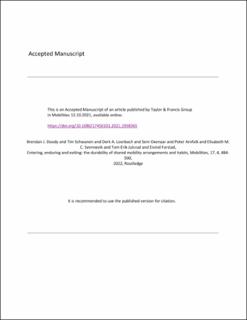| dc.contributor.author | Doody, Brendan J. | |
| dc.contributor.author | Schwanen, Tim | |
| dc.contributor.author | Loorbach, Derk | |
| dc.contributor.author | Oxenaar, Sem | |
| dc.contributor.author | Arnfalk, Peter | |
| dc.contributor.author | Svennevik, Elisabeth M.C. | |
| dc.contributor.author | Julsrud, Tom Erik | |
| dc.contributor.author | Farstad, Eivind | |
| dc.date.accessioned | 2023-06-20T14:23:32Z | |
| dc.date.available | 2023-06-20T14:23:32Z | |
| dc.date.created | 2021-10-14T10:40:48Z | |
| dc.date.issued | 2021-10-12 | |
| dc.identifier.citation | Mobilities. 2021, 1-17. | en_US |
| dc.identifier.issn | 1745-0101 | |
| dc.identifier.uri | https://hdl.handle.net/11250/3072335 | |
| dc.description | {Brendan J. Doody and Tim Schwanen and Derk A. Loorbach and Sem Oxenaar and Peter Arnfalk and Elisabeth M. C. Svennevik and Tom Erik Julsrud and Eivind Farstad}, {Entering, enduring and exiting: the durability of shared mobility arrangements and habits}, {Mobilities}, {17}, {4}, {484-500}, {2022}, {Routledge}, {10.1080/17450101.2021.1958365} | en_US |
| dc.description.abstract | Car sharing could support a transition away from private vehicle ownership and use. Attempts to understand participation in car sharing have primarily focused on minor and major disruptions which catalyse change in practices. This paper examines how processes of entering, continuing or exiting car sharing systems unfold in Norway, the Netherlands, Sweden and the UK. Car sharing is conceptualised as an arrangement of elements assembled, adjusted and supported by events, practices and habits. Drawing on biographically-oriented household interviews, we build on and extend existing understandings of change and stability in car sharing in four ways. First, by focusing on households rather than individual users, the paper complements recent attempts to understand the decoupling of family and private-car-based mobility. Second, under-examined processes of exiting, alongside entry and continuation are considered. Third, it highlights the importance of recognising more imperceptible, gradual and continuous changes which might not necessarily coincide with a disruptive event. Fourth, habits of shared car arrangements are demonstrated to be fragile and not as deeply ingrained as those associated with ownership. Existing household practices and habits thus raise further questions about the potential for shared mobility services to disrupt the primacy of the car. | en_US |
| dc.language.iso | eng | en_US |
| dc.publisher | Taylor and Francis Group [Commercial Publisher] Routledge [Imprint] | en_US |
| dc.rights | Attribution-NonCommercial-NoDerivatives 4.0 Internasjonal | * |
| dc.rights.uri | http://creativecommons.org/licenses/by-nc-nd/4.0/deed.no | * |
| dc.subject | Arrangement | en_US |
| dc.subject | car sharing | en_US |
| dc.subject | disruption | en_US |
| dc.subject | events | en_US |
| dc.subject | habit | en_US |
| dc.subject | mobility biographies | en_US |
| dc.subject | shared mobility | en_US |
| dc.title | Entering, enduring and exiting: the durability of shared mobility arrangements and habits | en_US |
| dc.type | Journal article | en_US |
| dc.type | Peer reviewed | en_US |
| dc.rights.holder | © 2021 The Author(s). Published by Informa UK Limited, trading as Taylor & Francis Group. | en_US |
| dc.description.version | acceptedVersion | en_US |
| cristin.ispublished | true | |
| cristin.fulltext | original | |
| cristin.qualitycode | 1 | |
| dc.identifier.doi | 10.1080/17450101.2021.1958365 | |
| dc.identifier.cristin | 1945850 | |
| dc.source.journal | Mobilities | en_US |
| dc.source.volume | 17 | en_US |
| dc.source.issue | 4 | en_US |
| dc.source.pagenumber | 484-500 | en_US |
| dc.relation.project | Norges forskningsråd: 255430 | en_US |

